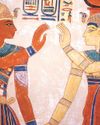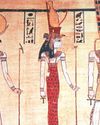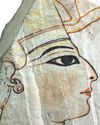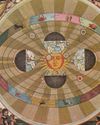Fire is a chemical reaction, called combustion, during which a fuel combines with an oxidizer to release energy and some byproducts. We see fire, because fire emits energy in the form of light. Sometimes you see products of this chemical reaction as smoke. If you are close enough, you can feel a fire’s released heat energy.

A LOOK AT FLAMES
You see flames because of the electromagnetic energy emitted as light by the hot gases, in part as blackbody radiation from their overall temperature and in part by specific colors emitted by the heated gases. Some of this emitted energy is visible light. The color of visible light emitted by a flame depends on the temperature of the flame. Once flame temperature reaches 500ºC (932ºF), the flame emits a substantial amount of visible light and is termed “incandescent.” Viewed in darkness, the first visible light emitted by a flame appears ghostly gray, because the color-sensing “cones” in the human eye are not activated at such low light levels. If the blackbody radiation is the dominant source of a flame’s color, the flame may become red as its temperature increases. It then changes to yellow and, finally, to an intense bluish-white. Flames from a wood fire appear largely yellow or orange, but, at their base, they can be much hotter and appear blue. White flames emit a good deal of energy as ultraviolet radiation. In fact, fire can give you a sunburn.
This story is from the {{IssueName}} edition of {{MagazineName}}.
Start your 7-day Magzter GOLD free trial to access thousands of curated premium stories, and 9,000+ magazines and newspapers.
Already a subscriber ? Sign In
This story is from the {{IssueName}} edition of {{MagazineName}}.
Start your 7-day Magzter GOLD free trial to access thousands of curated premium stories, and 9,000+ magazines and newspapers.
Already a subscriber? Sign In

Worshiping Heaven
For almost 500 years, emperors of the Ming and Qing dynasties offered sacrifices and prayers at the Temple of Heaven in Beijing.

Peace Reigns
The news spread throughout Egypt—a new pharaoh, Ramses III, now sat on the throne.

Problems To The East
Ramses III, the second king of Egypt’s 20th Dynasty, is viewed as Egypt’s last truly great pharaoh.

The Successors
Following the death of Ramses III, eight pharaohs, all named Ramses, ruled Egypt.

Stone Code
Hundreds of ships, led by the French general Napoleon Bonaparte, sailed from France in May 1798 on a secret mission.

Up & Away!
Eclipse observers often face unexpected difficulties, sometimes on their way to their chosen sites and sometimes at a site itself.

Edison's Eclipse Adventure
Thomas Edison (1847–1931) is the best-known inventor in American history.

Digging Up Copernicus
The scientist “who made the Earth a planet” is how the Harvard-Smithsonian astronomer Owen Gingerich refers to Nicolaus Copernicus (1473–1543). Copernicus’ path breaking book, On the Revolutions of the Heavenly Spheres,challenged the centuries-old belief that the Earth stood stationary at the center of the cosmos.

Demosthenes & Cicero
Even today, more than 2,000 years after they lived, Demosthenes and Cicero are still considered two of history’s most outstanding orators.

Confucius & Socrates
Some teachers are so inspirational that their influence lives on long after they die.